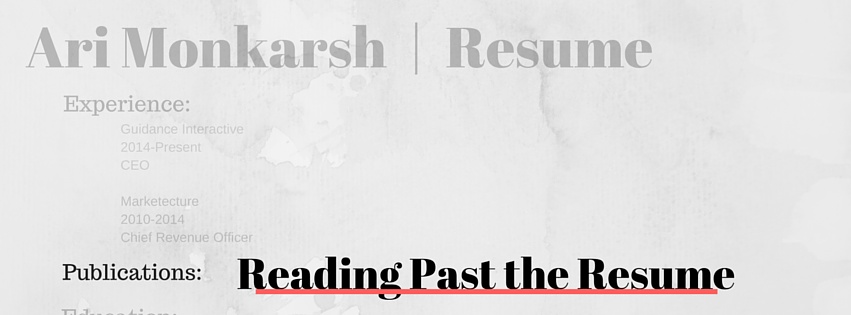
Flash back to college–the last year or two if you can remember it–when the biggest item on your agenda as graduation approached was getting a job.
Without a job you’d have no income, and without income you’d be dead broke, destined to couch surf for the rest of your days.
What were the biggest issues you were facing at the time? Building a strong network? Securing an internship or two for your last year, getting that valuable experience to pepper throughout your resume? Maybe one of the biggest issues for you was your resume–how you’d perfectly frame yourself as an individual to prospective employers.
Now, the shoe is on the other foot. As an established professional (if you’re not an established professional yet, these points should hit home all the same), you’ve secured a career and have seen success in the business world that have helped get you to where you stand today. If you’re the one vetting through resumes today, it’s may be time to rethink the way you’re approaching your candidates.
It’s time to read past the resume.
A candidate for a job is more than a piece of paper with their qualifications listed thereon. Anyone who has ever conducted an interview–really anyone who has ever been to an interview– knows how this works. Getting invited into the office to speak with the hiring manager, office manager or whoever else deemed you worthy of their time based on a slip of paper is the opportunity you’ll get to showcase who you are as an individual. That’s the time you can speak to your work ethic (“hustle” is the preferred term on my website), show off the communication and networking skills you’ve spent years honing in on, and outlining your strengths, weaknesses and desires for your future.
So why do bosses view the resume as the end all and be all of the hiring process? Of course it’s true that someone with four internships and a prior job in the field will have more experience with the work he or she will be doing, but who is to say they’ll be better than the fresh-out-of-school college grad with a work ethic that will put others to shame? The ones who call the organization a week after applying because they’re so interested are the ones that you want working for you, regardless of whether or not they studied abroad for a semester or graduated summa cum laude.
Hustle isn’t always reflected on a resume, and neither is a business-first mentality. For those, you have to consult the person, not just the slip of paper they emailed to you late one evening.
Judging an applicant simply by the resume they compiled of their relevant experience plus a section filled with buzzwords like “synergy,” can wind up costing you big time in the long run. It’s not until you get to know a person that you’ll understand how hard of a worker they are, what they’ll put into the company and where they want to go in life.
That’s not to say that resumes aren’t important, they certainly are. If you’re looking to hire a manager or fill a vacant spot on an executive board, experience is a huge factor. But when looking for jobs that don’t require years of experience, it may be wise to give those without the four-page resume a shot.
